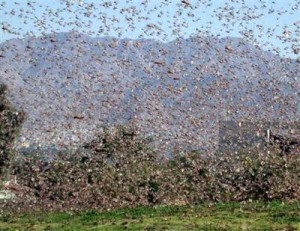News headlines and traffic signs are like tiny poems. Perhaps not as lyrical, but they do have one thing in common. Poems and road signs are both trying to convey a message in a very controlled and limited format.
Signs have to convey a specific message in only a few words. Poems, such as the haiku, also try to cram a lot of meaning into a very limited form.
The difference is that a sign or a headline is supposed to convey only one meaning, while a haiku is shooting for somewhere between zero and four. Sign writers are hampered by the rampant ambiguity of the English language. On the other hand, ambiguity is the fertilizer from which the flower of poetry grows.
How many meanings can you find in this haiku? (My bet is on zero, but I could be wrong. I only wrote it.)
Dog chases his tail
Center is always empty
The winners circle
My favorite buffet restaurant used to post this sign:
PLEASE CONSUME ALL FOOD ON THE PREMISES
This is a one-price, all-you-can-eat place, and the food is pretty good. I am positive that what they wanted to convey was, “The all-you-can-eat deal applies to you while you are here, and does not cover you taking as much away as you can carry when you are done stuffing your gullets.” There may have been a problem with customers filling up bags and boxes and bottles and drums to take home with them. So they wanted to make it clear that the admission price was for as much food as a person could eat during their visit.
The first thing that popped into my head was that the restaurant management was inviting us to clean the place out. “Please eat every morsel of food in the building,” was my interpretation, and I gave it my best shot.
It was a dangerous thing to say to us Midwestern Americans. We take our all-you-can-eat buffets seriously. It is in our history, going back to the locust swarms that used to descend on our crops and eat everything down to the bare dirt. We learned to copy their behavior out of necessity, eating everything in sight before the locusts had a chance. And now that we’ve eaten the locusts, and they are no longer a threat, we continue, out of the shear love of eating.
They don’t have that sign any more. Maybe somebody ate it.
I wish it was still there, only because it was one of my favorite examples of how powerful and stupid English can be. It becomes especially ambiguous in the short form: texts, headlines, signs and poetry. Why include poetry with news headlines? Poetry is English distilled, like liquor. Sometimes there is meter and rhyme scheme, so the poet is forced to reverse normal word order, or leave words out. Which leads to double meanings of phrases, which in poetry, can be a very cool thing. You want to say one thing, and mean something else. Metaphor. That is the power of English.
The stupidity of English is that sometimes you want to be very specific, and it won’t let you.
My dad loved to smoke. When we’d yell at him not to light up, pointing at the sign forbidding smoking, he’d say with his all-knowing smirk, “Look at the sign. It doesn’t say I can’t smoke here.”
NO SMOKING ALLOWED
“What are you talking about? It says clear as day NO SMOKING!”
“No. It says it is OK if you don’t smoke. NO SMOKING is ALLOWED. So I won’t force you guys to smoke if you don’t want to. The sign says it is OK for you to stand here and not smoke.”
We knew it was useless to argue with him. Even if we got a security guy to come over, Dad would probably confuse him enough that he’d let him finish his cigarette.
Other languages do not rely so much on word order to supply meaning. One word is clearly the subject of a sentence and another is the object of the sentence, designated by word endings. In German you can put the words in almost any order and still know whether the dog bites the man or the man bites the dog. English relies on our brains to group the words together to get the right meaning. But brains have a tendency to find their own meaning, even in places where there is none. My brain differs more than most, I’m afraid. That’s why I enjoy new headlines like these (gleaned from http://www.fun-with-words.com/ambiguous_headlines.html):
KIDS MAKE NUTRITIOUS SNACKS
JUVENILE COURT TO TRY SHOOTING DEFENDANT
ENRAGED COW INJURES FARMER WITH AX
The last short form of English that features these ambiguities is the joke. It takes just as much skill to construct a great joke as it does to compose a sonnet. The difference is that with the joke, you don’t want to convey both meanings at the same time. You only want the listener to get one meaning — the wrong one, on purpose. You already know this classic example:
“While on safari, I shot an elephant in my pajamas. How he got into my pajamas, I’ll never know.”
Ah, poetry!
